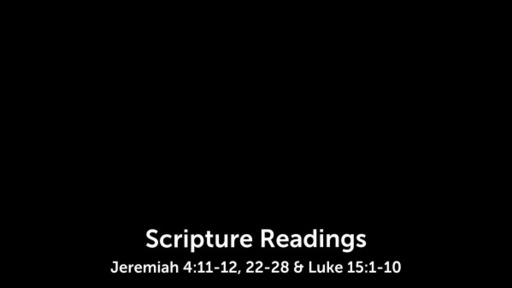Found and Re-found

Notes
Transcript
Sermon Tone Analysis
A
D
F
J
S
Emotion
A
C
T
Language
O
C
E
A
E
Social
Jesus was traveling through Galilee, on his way to Jerusalem.
People often gathered around Jesus.
Jesus’ disciples and detractors followed him.
Jesus’ disciples and detractors followed him.
The tax collectors and sinners wanted to hear what Jesus had to say.
The tax collectors and sinners wanted to hear what Jesus had to say.
He ate with sinners and tax collectors (seen as collaborators with their political enemy, Rome).
Some Pharisees and scribes judged Jesus because he associated with these people.
Some Pharisees and scribes judged Jesus because he associated with these people.
They muttered against Jesus, just as those who muttered against God in the desert.
Eating with someone normally signifies approval of a person and their lifestyle.
To them it may have looked like a Jewish Rabbi was joining in sinful activities.
This would ultimately lead to his death by the very same leaders.
Jesus was doing something different.
Jesus was doing something different.
He was being with, but not necessarily approving of, people.
If they cannot to find the mercy from God, why would they seek God?
If they cannot to find the mercy from God, why would they seek God?
We seem to think we need approval from others.
We seem to think we need approval from others.
Maybe, we weren’t loved by our parents as much as we needed.
Maybe, we are seeking to advance ourselves through ambitious resolve.
Or, like the people in this passage,
Maybe we are just trying to live our lives and find ourselves judged by supposed leaders.
Maybe we are just trying to live our lives and find ourselves judged by supposed leaders.
Rather than pleasing those that seem to hate us,
We simply recognized that someone always loves us and wants the best for us?
We simply recognized that someone always loves us and wants the best for us?
What if we were given the opportunity to make things right with them? Wouldn’t you take it?
Thankfully, God has a way of getting our attention, drawing us out of ourselves, and showing us the way back home through gracious forgiveness.
Thankfully, God has a way of getting our attention, drawing us out of ourselves, and showing us the way back home through gracious forgiveness.
Jesus responded with parables to help them understand why he ate with sinners.
Jesus responded with parables to help them understand why he ate with sinners.
A shepherd who lost a sheep goes to find it.
Lost sheep often and die easily when not being protected with others.
(Traps or Wolves)
A lone woman who loses a coin tries to intently find it.
Lost coins are often taken by another or their own gain.
The sheep and the coin are pursued by the one who most values them.
The sheep and the coin are pursued by the one who most values them.
Only someone who values them rejoices over their return.
“Righteous persons who need no repentance.”
There is not one. (Psalm 14:1; Rom. 3:10)
This “righteousness” is by outward appearance only; unchanged in heart and life.
This “righteousness” is by outward appearance only; unchanged in heart and life.
This is an implicit condemnation of their judgment.
Those who say, thank God that I am not a sinner like that other person. (Luke 18:11)
In Jeremiah, God’s warnings of doing evil were made clear.
God who alone is righteous will respond to evil doing with divine power and authority. (Jeremiah)
God who alone is righteous will respond to evil doing with divine power and authority. (Jeremiah)
“I have spoken, I have purposed; I have not relented nor will I turn back.” – vss. 28
God purposed his judgments to address their willful ignorance and doing evil.
Mourning waywardness is an essential act of humility; true repentance.
Mourning waywardness is an essential act of humility; true repentance.
God does not sit in judgment forever but remembers to have mercy.
“I will not make a full end” – vss. 27
(that will not be the end of it)
He who confesses and forsakes transgression will obtain God’s mercy. (Prov. 28:13)
Jesus ate with sinners because he was there to be with them.
Jesus ate with sinners because he was there to be with them.
Jesus went find them.
How are sinners able to come to God if God does not first go to them?
They were worthy of his presence, mercy, and grace.
Their return was evidenced through a changed heart and life in repentance.
They are made righteous by the only Righteous One.
They are made righteous by the only Righteous One.
Why would sinners come to God if God does not have joy when they return?
God rejoices over them, readily forgiving and receiving.
God rejoices over them, readily forgiving and receiving.
The joy of their returning to God is what made the crucifixion worth enduring.
God always pursues us and provides a way for us to return by his grace.
God always pursues us and provides a way for us to return by his grace.
We are pursued by the one who loves us.
The one who loves us the most is God.
Everyone is of sacred worth to God who loves them.
Everyone is of sacred worth to God who loves them.
All of heaven rejoices over even one who returns.
All of heaven rejoices over even one who returns.
We must pursue the lost loved ones of God and rejoice with God upon their return.
We must pursue the lost loved ones of God and rejoice with God upon their return.
Are we readily going to the lost loved ones of God, readily forgiving, and receiving them as our own?
